Library
All resources
1761 – 1780 of 2421 results

Impact of Multipurpose Cash Assistance on Outcomes for Children in Lebanon
Report
This report examines the impact of multipurpose cash assistance (MCA) on children, specifically looking at child outcomes and child protection outcomes, in Lebanon. The impact of the Lebanon Cash Consortium MCA program was measured using a variety of indicators for shelter quality and consistency, child...

AAP Minimum Standards for Complaints & Feedback
Guidelines and Tools
A complaints and feedback mechanism (CFM) is a formal mechanism for receiving and responding to complaints from people in communities where we implement programmes. The main objectives are to increase the influence of affected communities over programmes, ensure that incidences of dissatisfaction with the...
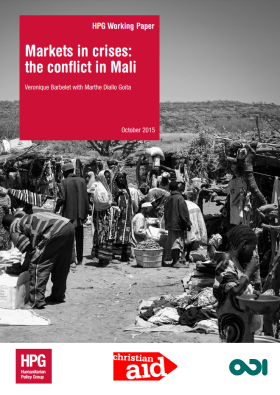
Markets in Crises: The Conflict in Mali
Case Study
Humanitarian agencies routinely conduct market analyses to inform decisions around transfer modality – cash, voucher or in-kind – with a strong emphasis on the availability and price of key commodities. However, in the last few years humanitarian organisations have expanded their scope to...

A Review of Evidence of Humanitarian Cash Transfer Programming in Urban Areas: Annexes
Report
Annexes to accompany the working paper ‘A review of evidence
of humanitarian cash transfer programming in urban areas”
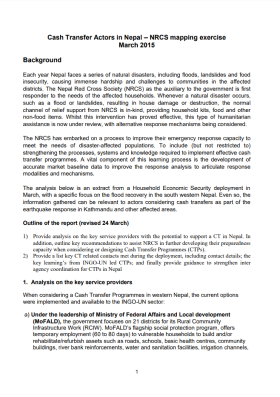
Cash Transfer Actors in Nepal – NRCS Mapping Exercise
Report
Each year Nepal faces a series of natural disasters, including floods, landslides and food insecurity, causing immense hardship and challenges to communities in the affected districts. The Nepal Red Cross Society (NRCS) as the auxiliary to the government is first responder to the needs of the affected...

Integrating Cash Transfers into Gender-Based Violence Programs in Jordan: Benefits, risks and challenges
Report
With limited global practice and guidance on programming cash transfers to enhance protection in an emergency context, in 2013, the International Rescue Committee’s (IRC) started cash transfer programming (CTP) as part of the urban Women’s Protection and Empowerment (WPE) program in Jordan. Three...
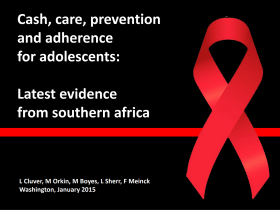
Cash, Care, Prevention and Adherence for Adolescents: Latest evidence from southern Africa
Presentation
This presentation looks at cash, care, prevention and adherence for adolescents using the National Longitudinal study of Adolescents in Southern Africa.

Cost-Effectiveness Analysis of Cash-Based Food Assistance Projects: A case study and discussion paper of findings in Niger
Report
Despite recent and expanding literature on cost effectiveness and value for money, there is little by way of guidance for the implementation of cost-effectiveness analysis in humanitarian and development programming. This report distills findings from the literature on ex post cost-effectiveness analysis,...

Cash Transfer Program in Northern Syria
Report
Humanitarian needs, both in Syria and neighbouring countries (Lebanon, Jordan, Turkey and Iraq), have rapidly increased since the beginning of the conflict. The Aleppo governorate, as one of the county’s most populated areas with a total population of 4,670,000, has suffered from the consequences...

Financial Services Primer for Humanitarians
Guidelines and Tools
Financial services facilitate a wide range of economic and households activities in any society. They enable trade and business expansion and allow individuals to save, send and borrow money. Humanitarian cash transfers, particularly when delivered electronically,can expand access to financial services...
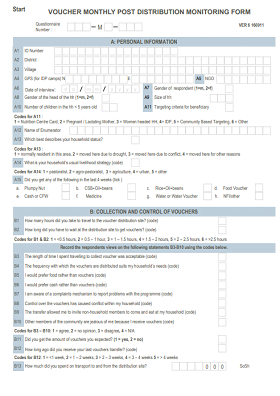
Voucher Monthly Post Distribution Form
Report
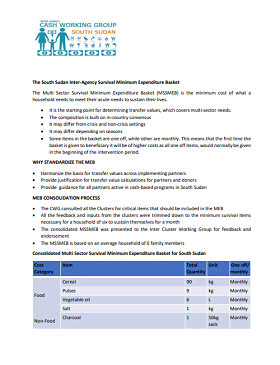
The South Sudan Inter-Agency Survival Minimum Expenditure Basket
Report
The Multi Sector Survival Minimum Expenditure Basket (MSSMEB) is the minimum cost of what a household needs to meet their acute needs to sustain their lives.
• It is the starting point for determining transfer values, which covers multi-sector needs.
• The composition is built on in-country consensus

Cash Transfer Programming for Syrian Refugees: Lessons Learned on Vulnerability, Targeting, and Protection from the Danish Refugee Council’s E-Voucher Intervention in Southern Turkey
Report
DRC Turkey is currently implementing a two-year, DFID-funded project that aims to provide immediate support to and strengthen the coping mechanisms of vulnerable non-camp Syrian refugees in southern Turkey. The first phase of the project focused on identifying and providing monthly cash transfers (in the...

Cash in Emergencies Toolkit
Guidelines and Tools
Access Toolkit Here Cash transfer based programming (CTP) is an effective and flexible way to support people affected by emergencies, maintaining their dignity and choice, while fostering local economies. CTP includes all forms of cash and voucher-based assistance. The Cash in Emergencies Toolkit has been...
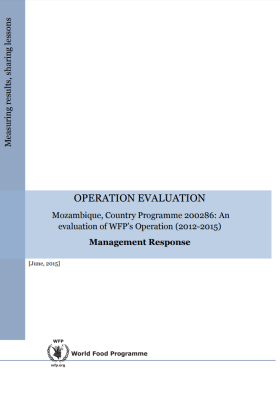
Mozambique, Country Programme 200286: An evaluation of WFP’s operation (2012-2015) – Management Response
Report
The final evaluation covers WFP’s country programme (CP) 200286 (2012-2015). It was intended for both accountability and learning purposes and focuses on assessing: the appropriateness and coherence of the operation its results the factors explaining the results. The evaluation assessed the...

Household Cash Transfer Assessment – Typhoon Haiyan Recovery Response
Report
An estimated 16.1 million people were affected by typhoon Haiyan, with 1.1 million damaged or destroyed homes and as many as 4.1 million people displaced – nearly four times as many as those left homeless by the 2004 Indian Ocean tsunami. At least 6,300 people lost their lives and another 5.9...
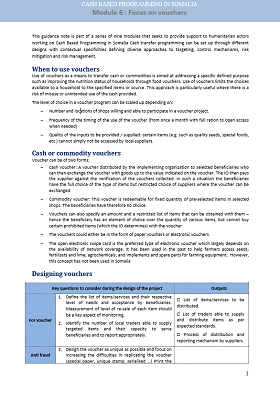
Cash Based Programming In Somalia – Module 6: Focus On Vouchers
Report
This guidance note is part of a series of nine modules that seeks to provide support to humanitarian actors working on Cash Based Programming in Somalia Cash transfer programming can be set up through different designs with contextual specificities defining diverse approaches to targeting, control...

The Impact of Cash Transfer Programmes on Protection Outcomes in Afghanistan
Report
Although cash-based interventions (CBIs) are increasingly used to deliver humanitarian assistance in support of more traditional in-kind emergency distributions, there is now a growing, global acceptance among stakeholders of the need to pay closer attention to the positive and negative impact of CBIs on...
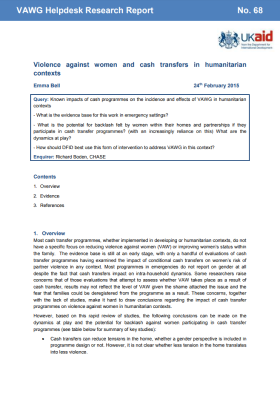
Violence Against Women and Cash Transfers in Humanitarian Contexts
Policy paper
This report addresses the known impacts of cash programmes on the incidence of violence against women in humanitarian contexts. Query: Known impacts of cash programmes on the incidence and effects of VAWG in humanitarian contexts What is the evidence base for this work in emergency settings? What is the...

Remittances to Syria: What works, where and how
Report
This study sought to understand remittance flows into Syria, and established that various Informal Value Transfer Systems (IVTS) are used, to the exclusion of the formal banking sector. Registered and unregistered hawala, courier services and family connections are used. Remittances have played an...